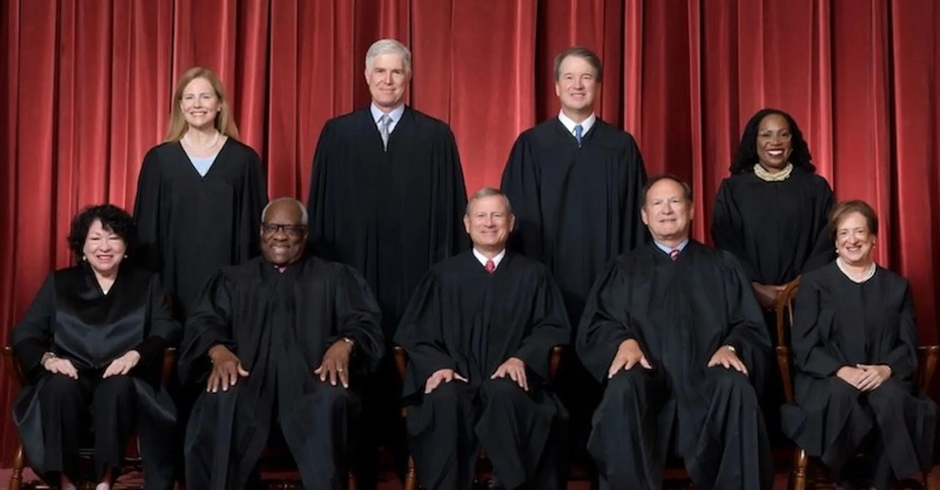Supreme Court Hears Immunity Arguments, Likely to Send Case Back to Lower Court
The issue of presidential immunity is being tested in the DC political Lawfare case against President Donald Trump.
As the Jack Smith prosecution claims President Trump tried to “overturn the results of the 2020 election,” the issue of presidential actions intended to secure & protect the legitimacy of election outcomes becomes a focus.
The legal counsel for President Trump has stated any action by the president to ensure election security falls within official acts, and is therefore subject to immunity from prosecution. The special counsel claims the act of reviewing an election outcome is a private benefit to the president and not part of presidential immunity.
The Supreme Court is now involved in determining whether the President of the United States has immunity from prosecution, or whether any/all future presidents can be prosecuted for their action while in office. Inside the debate is the larger question of whether the “bureaucratic state” controls the president, or whether the office of the president controls the executive branch bureaucratic state.
The leftists and communists agree with former AG Bill Barr, that institutions run the government, and the office of the President is simply a figurehead within it. In essence, the DC institutions are omnipotent and powerful, and the president is simply occupying space the deep state allows. That’s the core ramification within the immunity argument.
In this video, Justice Brett Kavanaugh asks several questions about limiting the immunity of the president and some of the ramifications that will surface for future presidents. WATCH:
Interestingly, at 2:30 of the video, Justice Kavanaugh notes the current Lawfare approach – crowdsourcing for prosecution angles with the DOJ, which was the same Lawfare approach used by the beach friends to attack Kavanaugh’s nomination. Judge Kavanaugh uses that hidden reference point – very subtlety – but its inclusion shows that he knows exactly what is taking place here.
I also like the part where the DOJ argues President Obama is not guilty of murder, via drone strike, because the type of murder created by Obama in that situation was “lawful murder.” Collateral killing via drone strike is considered by the DOJ to be: the lawful murder of another person with malice of forethought and specific intent to kill.
Gee, what could possibly go wrong with the DC administrative Deep State having the power to determine what is “lawful conduct” vs “unlawful conduct” by their political opposition? Oh wait, it’s done by DOJ statutory interpretation, lolol… now I feel better. Good grief, can people not see where this ends.
That said, here’s what the SCOTUS is going to do… I’m 95% certain of this.
[Oh, and Steve Bannon’s insufferable legal analysis, by Mike Davis, is GASLIGHTING. Davis is an idiot and totally dishonest legal mind (wants to be AG – God, help us), who only tells MAGA what they want to hear; so, I would suggest ignoring his claim that SCOTUS will rule support for Trump with absolute immunity. Mike Davis is totally wrong.]
The Supreme Court is not going to get into the debate of what action is “immune” vs what action is “not immune”; the court simply hates that stuff.
This unwillingness to get into the granular debate of statutory interpretation is the same reason why the court will not look at what the executive branch defines as “classified documents” vs “non-classified” documents. Once they open that Pandora's box, there would be a bazillion appeals for a SCOTUS writ on the baseline of illegitimately denied FOIA requests. They ain’t going to touch it. Same applies here.
The Supreme Court is going to send this back to the lower DC court, and tell them to hash out the issue of “private interest” acts vs “official” acts. This is the core of the originating issue.
Was President Trump ensuring the integrity of an election outcome he considered sketchy (official act), or was President Trump trying to overturn the election by ensuring election integrity (private interest act).
That’s the question that SCOTUS is going to tell the lower court to battle out, and then the SCOTUS will weigh in if needed. The Supreme Court is going to send this case back down to the lower court for definitions of “official act” -vs- “private interest act” before they will touch the immunity issue.
Here’s the full oral argument hearing at the Supreme Court:





Post a Comment